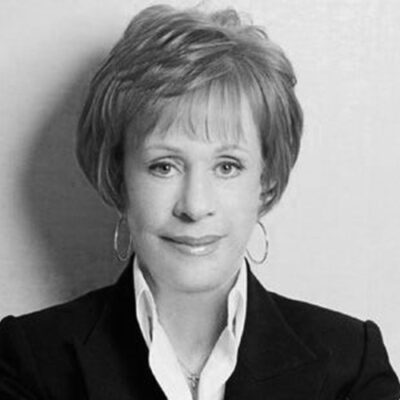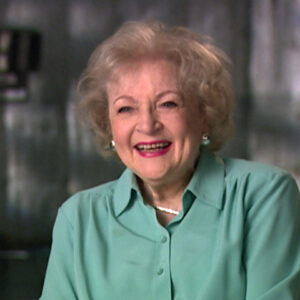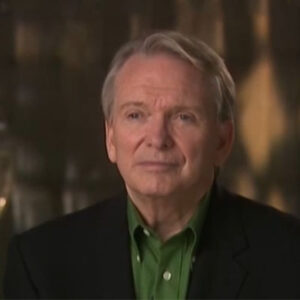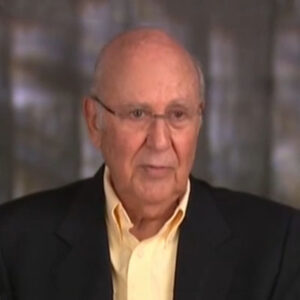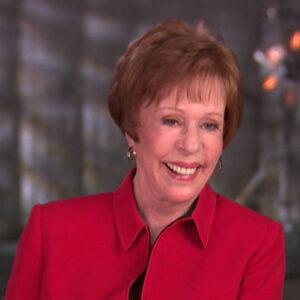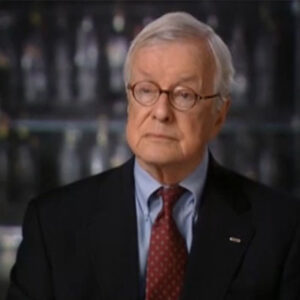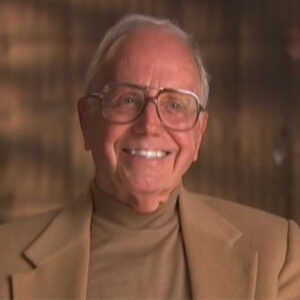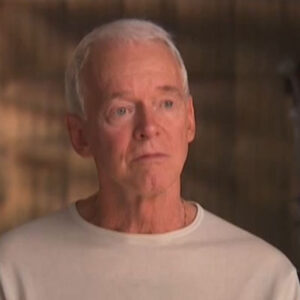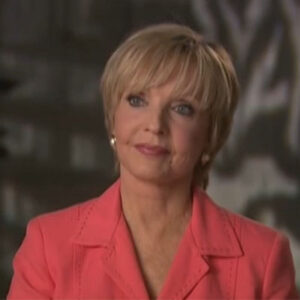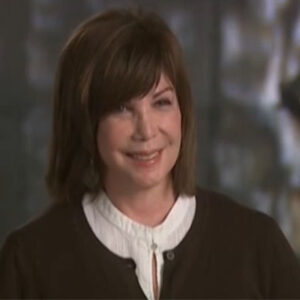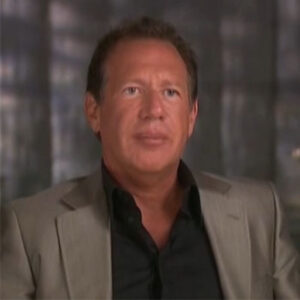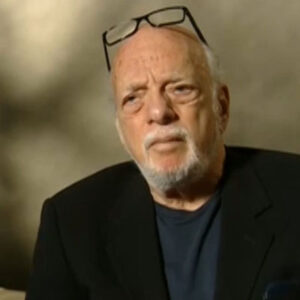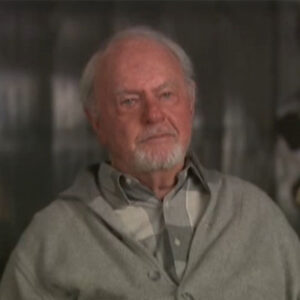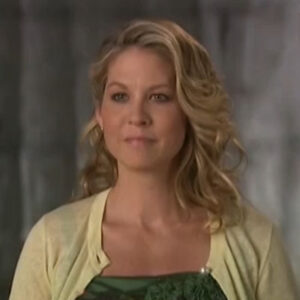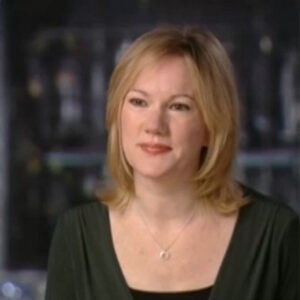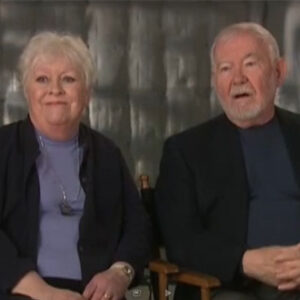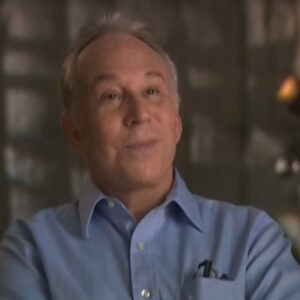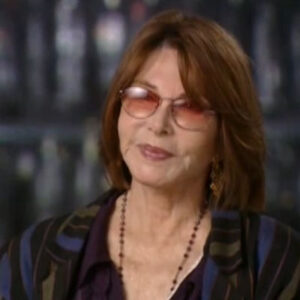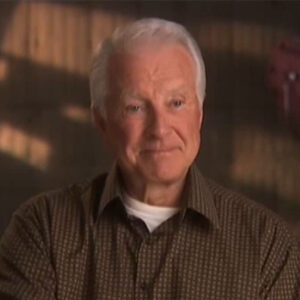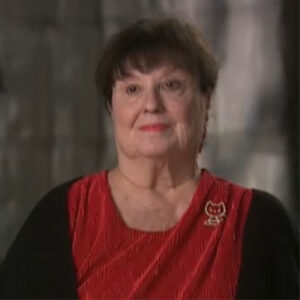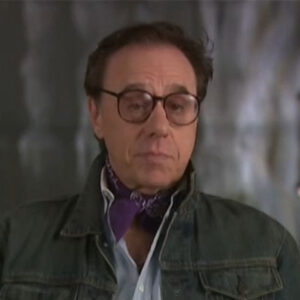Felicia Henderson: Growing up, yes. Thank you for reminding me when we talked. And I’m like, that feels like a million years ago now. But, you know, grown when I was growing up, a very young girl like The Carol Burnett Show for my grandmother was her favorite show. Like the house stopped, you know. And she didn’t want to be bothered. She didn’t want anyone talking to her. You knew your place. You know, mine was to the right of her knee on the floor by the sofa, you know. And we watched it. And that was it. That’s what happened. And we all knew, like, oh, it’s grandma’s time now. And so that for me as a young girl and probably one of the reasons I ended up growing up to write comedy is because that’s what I remember television being is The Carol Burnett Show. That’s what I know comedy to be. That’s what I know sort of perfect and brilliant performance to be. So for for me, that’s what I knew first. You know, my friends were watching maybe The Brady Bunch or whatever, was watching The Carol Burnett Show.
Interviewer: And then what was your first job?
Felicia Henderson: Well, my first job in the business was actually at NBC. I had NBC paid for my graduate school, actually for my MBA through an NBC fellowship. And so from that, I then got like I’m in a management training program at you at NBC. And so the night one of my first jobs was I was a current executive on Carol and Company. And I mean, I begged for that job and I was like this little junior executive fresh out of the MBA. And they’re like, you know, what shows are you going to work? And it’s want to work on. They expect me to say the Fresh Prince of Bel Air or Seinfeld. And I’m like, if I could just get on Carol and company, I would be so happy. And they were like, Really? I said, absolutely, because I just wanted to be where she was. I just wanted to be in her presence. I wanted to watch what I’d seen on television all those years in person, you know, even if I could just get to rehearsals to see where does this brilliant start and what is the process that this woman goes through before she gets in front of the audience. I wanted to see from table read, you know, to going through the week for rehearsals. And then finally on the Friday night taping, that’s I’m like, I’m I’m going to get paid for this. I would have done it for free.
Interviewer: And what did you learn in the process?
Felicia Henderson: That she’s a genius. I guess I didn’t learn that right. I guess I already knew that. But I got to watch that. And what a serious endeavor it was. You know, what we see in front of the camera is the brilliant comic timing and the variety of skills. But what I learned behind the scenes, literally, I would just sit, you know, in the bleachers and and just watch like I was the audience. And it was a very meticulous, serious, very sort of controlled and every element of it there. There are surprises in the performance, but there was no surprise in terms of sort of how they got there, you know, because it was obviously incredible and intense work. And I love that about it.
Interviewer: I to just sort of go back to the beginning. Actually, you know, let me. Yes. Can we talk about when Carol started it was in the 50s.
Felicia Henderson: Yes. Mid 50s. Yes.
Interviewer: Can you talk about what those stereotypes were at that time?
Felicia Henderson: Oh, gosh. Well, the stereotypes for women in comedy, more in television. The stereotypes for women in comedy and television were very supportive roles. And it wasn’t and even still is. And in some ways a very popular accepted for women to be funny and to be sort of unapologetically funny, to make fools of themselves. That was considered a very male endeavor. So when someone like Carol Burnett comes along and unabashedly shows her skills unabashedly, we’ll do anything for the laugh. Much of the same thing like you saw with I Love Lucy, like won’t do anything to get the laugh at all. It’s still in a very male dominated world and where not only in the audience, but other performers expected women to be sort of this this this straight character, you know, that was there to support the person who was there to be funny, which is usually the male. So when you put someone like Carol Burnett, you know, front and center who can stand up, if you will, and lots of cases exceed her male counterpart. That wasn’t a very popular thing, particularly in the 50s. So you’re still living, even if you have that kind of talent. You’re still living within a particular point in history. So you still end up probably more on the personal side. And I’m still sort of, you know, sort of subjugating yourself to the situation, because even if you have that kind of talent, you’re not you’re still living in the mid 50s. So you’re not as comfortable, if you will, with with being as funny as you are.
Interviewer: Can you mention any of the other women at that times?
Felicia Henderson: Sure.
Interviewer: How Carol, maybe was different?
Felicia Henderson: Yes. How that she was different? Well, I think that when you think about Imogene Coca and to some extent Nanette Fabray and a lot of other women at the time were very much more supporting roles. Brilliant comedians. Right. Who come from similar backgrounds of doing what was considered almost summer stock. You know, in the Catskills at the summer resorts, which was great breeding ground for amazing comedy, but they still were usually paired with comedians, with males who were there to be the center of attention. And where all the comedy landed, if you will. And so for someone like Carol Burnett, who started in some of those same positions and got some of those same roles, but was sort of immediately put into the center because of her skills, because of her willingness to do anything for the comedy, for the joke, it kind of made her stand out and put her in a class in a category by herself as the center of the comedy.
Interviewer: I just want to go back to the very beginning. And if you can talk about where she grew up and how that influenced where or how or where or how.
Felicia Henderson: OK, so more about when she moved to California or more. OK. OK. Ask me that question again. I’m not sure I understand.
Interviewer: Just if you can talk about where she grew up in her formative years. OK. That influenced her, her choice of career.
Felicia Henderson: OK. Of course. Well I think that if, you know, grow as a kid right now, moving to California early and moving specifically to the Hollywood area and any kid who moves here or certainly a lot of kids who move here, that that influences what your dreams are. And when you combine moving to the sort of the center of the creative universe, if you will, with her particular personal background, with Carol Burnett’s particular personal background, most particularly with comedians, a lot of that comedy comes from what your background is, what your personal pain may have been. And you take you bring that to Hollywood. You bring all that personal pain. You bring what your own experiences to Hollywood. And it really then, I think very much forms the kind of performer you’re going to be or what you are willing what place you’re willing to go to sort of inside. And I think sometimes when you look at particular background like hers, once you’ve been through some of the things that she went through on a personal level, I mean, you know, making yourself look silly for a joke, you know, becomes very easy compared to what you have experienced on a personal level.
Interviewer: Can you just describe briefly what you know about her growing up, her family life?
Felicia Henderson: Well, I think as you know, this sort of the things that we know as an audience knows of really of a Carol Burnetts relationship with her grandmother and how important that was. But I think when you grow up in a home where there is not only emotional abuse but, you know, alcohol abuse, a lot of times, then where you go is inside. You have to become sort of not only the place where you find safety is in your own interior, but you learn to talk to yourself. You learn to take yourself to other places. It really is all very formative in terms of the kind of performer that you become, because this whole world that you create to escape the world that you actually have to live in not only is interesting and creative, but it is how you survive. So those developing those survival skills, then we as an audience got to see those skills and how that sort of formed that the performer that she would become.
Interviewer: Do you think that was part of her? What’s so amazing about her is it wasn’t just funny slapstick. We felt there was this under, this layer underneath.
Felicia Henderson: I think one of the things that was is so amazing about Carol Burnett as a performer and why an audience so relates to her is absolutely. Underneath it all is one, there’s this amazing intelligence and then there’s this warmth that is combined with that intelligence. And not only sort of. And then on on top of that, then there is this comedic intelligence, which is something completely different. But it makes her also relatable. And you almost can’t come to the camera and come to the audience without your background. It doesn’t your background sort of doesn’t allow it. So all of that comes with you and rather your goal is to share that or not. It is so much a part of your fabric that it becomes part of the performance.
Interviewer: That’s great. Thank you. So I want to talk about when she came to New York. So if you can, which was in 1954, if you can talk about that move and what her goal was.
Felicia Henderson: Well, I think that, you know, for for Carol Burnett, going from Los Angeles to New York, well going to New York was always the goal. But that’s a big move and an expensive move when you’re poor. So, again. I mean, I think what we learn about her entire life is that it is a life of dreams and life’s a life of sort of continuing, hoping to be someplace else, if you will, from the personal side as a child all the way up through the performer. So being in Hollywood. That’s a great place to start in those early opportunities. But but always wanting to be in New York. Always. I mean, when you have that kind of talent wanting to go where live performance is so valued and where there’s a sort of bigger stage, if you will, for the kind of talent you have. So moving, getting an opportunity finally in the mid 1950s to go to New York to be on the live stage to sort of in a place where that talent, that huge talent can’t be too big, you know, is something that really, I think benefited her as a performer and allowed her to grow even more because she could go there and really know. And that’s what we saw happen, that that performance and what she was able to do was really value there.
Interviewer: Tell me how she broke in, in New York. Some of her first. Jobs.
Felicia Henderson: I’m not sure if I remember the first jobs.
Interviewer: Well, she she actually first television appearance was on the Paul Winchell show.
Felicia Henderson: Yes. Yes. And she ended up there for like 13 weeks or think. Like a whole season.
Interviewer: She did a few. She did a few months. She was always straight.
Felicia Henderson: Straight. That’s right. She never got to do comedy there. I’m sorry. Thank you for reminding me. But in that move to New York, being able to go to New York in the mid 50s and getting the big break on the Paul Winchell show. But still, we still didn’t get a true idea of the range of her ability because she was always the straight person who got to sing. She had that amazing voice and that very loud voice. So she was able to do that, but no real comedy. She didn’t really do any comedy on that. So from what we know, you know, of her legacy in the comedy. It’s a really amazing start that she was on that show but didn’t really do much comedy there.
Interviewer: Her first comedic appearance was actually Garry Moore.
Felicia Henderson: Yes, that’s what I’m thinking of, is the Garry Moore show where she ended up like on The Garry Moore Show, going from that to The Garry Moore Show. Some things in between. But the opportunity on The Garry Moore Show was really the first opportunity to show her comedic chops. And I guess, you know, sort of the rest is history. But going from playing the straight, which as we talked about in the mid 50s, that’s what women that was the opportunity for women was to do the straight role, to play the straight role to the male comedian. And so finally, getting an opportunity to show her skills as a comedian. Garry Marshall was a really I said Gary Marshall didn’t I? On the Garry Moore. Getting an opportunity to show her comedic skills on The Garry Moore Show was a really sort of major turning point in her career.
Interviewer: And talk about that time, too. What was the state of the variety show?
Felicia Henderson: Sure. Yeah. And in the mid 50s, the variety show was the most popular genre of television going back even to the Texaco Star Theater. And I mean, Milton Berle, you can’t even imagine now getting those kind of numbers where literally the country would stop. Stores would close. You know, families would sit down. That’s how big that was. And not only Milton Berle, but just the genre in general. So if you could get on a variety show, you know, which might have singing and dancing animal acts, tricks, you know, of course, sketches and skits. It was very different, though, kind of variety show than what we think of variety as today. But there was certainly a lot of intelligence on the skits and sketches were written very differently than they are now. Lot of take offs, you know, famous movies and famous movie stars with this sort of wonder and respect at the same time. So for her to then get an opportunity to transition, if you will, into variety shows, then we gave us an opportunity to see her in more of the different kinds of skills from the everything from the dancing, the singing that, you know, comedic timing. And once she was able to.
Interviewer: Why do you think why was the variety show such a great format in the early days of television?
Felicia Henderson: Sure.
Interviewer: Talk about why that was.
Felicia Henderson: Yeah, I think the variety show format was the most popular and significant in early television because sort of the history of where entertainment comes from. It was a history that from vaudeville and from things like the Catskills and those kinds of shows and radio where also on performance was live. And so when you think about transitioning to television, you transition with what is the most successful kinds of entertainment genres, if you will, at the time. And so for television at the time, what was life? You know, you can only do what’s life, but that’s what comes to television as sort of vaudeville, if you will, comes to television. But it’s also there was no such thing as taping a television show. There is no such thing in the early days, this sort of network show. So whatever is live is all that we had, basically. And it also meant that as a performer, you really had to be good. And on top of your game, there is no take two.
Interviewer: This was kind of landscape Carol was walking into.
Felicia Henderson: Sure. Yeah. And I think that when you look that in the 1950s, in the mid 50s and where television was in that variety was the important genre that it was, it’s really is perfectly made for performer like Carol Burnett to walk into. Who has these amazing skills, if you will, and who had the background that she had. So that for her being able to perform live. Being able to sing. Being able to do sketches. Being able to do all of that. This is a perfect sort of backdrop for where her talent would go and how much she would grow.
Interviewer: I forgot to ask you about Green Hedges and Tamiment, just explain what these were. They were almost like schools.
Felicia Henderson: Yeah, yeah. I mean, I think that, um, some of the vacation resorts in the Catskills, you know, places where families would go during the summer were really amazing breeding grounds for like a set like a summer stock, if you will, for really talented performers. And you get some of the first television shows. That’s where they got their performers are you think about people like Imogene Coca and Carl Reiner were sort of in front of the camera, but even in it behind the camera as well. People like Lucille Kallum, who was one of the original writers on your show of shows, all were writing for the Imogene Cocas and people like that in the Catskills. So not only where their performers picked out of those those places, but so where the people who were writing and directing and what they were performing. And so you have some of the early television shows like the Broadway Admiral Review was a direct result of and sort of taking a very specific performance right out of tournament and bringing it to television,.
Interviewer: Were they also mean for someone like Carol, for example, who wasn’t trained, really, wasn’t it?
Felicia Henderson: Absolutely. So those summer resorts really served as a school, as a training ground for some of these young performers who didn’t necessarily have the classic training, if you will. But if they could get to some of these resorts during the summer and again, you had this a level of talent that you could then get a chance to perform with and you’re getting your stuff is being written, your materials being written by really talented writers and the music and the songs. All of it has been written by these amazing people who went on, a lot of whom went on to have really big careers. So it becomes almost like a school where you go to hone your craft.
Interviewer: I want to go back to the Garry Moore Show, but there was another show that Carol did briefly before that 1956. And what we can see early glimpses of her potential.
Felicia Henderson: Yeah, I think that I think 1956 Carol did. I’m Stanley and which was a Buddy Hackett Show buddy up for a show developed for Buddy Hackett. And she was brought into play his girlfriend. And I think that what we see in the very obvious early performance, obviously an early performance for her is sort of this bit of. Not enough to say that the. Can I start over. OK. Sounds like that’s to mean to Buddy Hackett. Okay. I think that in 1956, Buddy Hackett, there was a shell developer, Buddy Hackett called Stanley and Carol Burnett was eventually brought into. I think it started as like four one episode to play his girlfriend. And once she was so brilliant. But also the chemistry between them was so good that she then did multiple episodes of that. But what we see in the banter, if you will. And, you know, they always the couple always had these arguments and these misunderstandings about what their relationship was and whose role was whose role it was to do what we do in those scenes with him. We just see her sort of standing on her own, if you will, in there, theirs in the performance. This just wonderful sparkle, this wonderful thing where, you know, this woman is going to be a star on her own. She will not have a career where she is supporting a man for the for her entire career.
Interviewer: And you think what you did was your eyes drawn to her?
Felicia Henderson: OK. That’s the nice way of saying what I was thinking right now. OK.So and in in Carol Burnett, scenes with with Buddy Hackett again, they had wonderful chemistry, but at the same time, your eye is really drawn to her. Um, you know that there’s something very special about her. And that is almost in those scenes, you almost see her, in a way, holding back this amazing talent that really wants to just come out and shine. But that’s not the goal of that role. So there’s a controlled but there’s also this sparkle of brilliance and potential.
Interviewer: And on The Garry Moore Show, what was what was her role on that show? Was she brought on? What was your second?
Felicia Henderson: Yes. When when when Carol Burnett was brought onto The Garry Moore Show, um, the role was what? The role, again, was very typical role for women. And in the mid 50s, which is to be the second banana, if you will, to be often sometimes you would get the joke, but the joke would be at your expense. But for the most part, the goal was still to be the straight man to make sure that your counterpart looks funny. So but again, there’s so much natural talent there that even as the straight man, she ends up getting all the laughs, you know, the straight man, the straight woman, she ends up getting all the laughs because what she could do with a look, what she could do with no dialogue, without a joke, because her entire body, you know, is is part of the joke when you see her performing.
Interviewer: And what did she do for that show?
Felicia Henderson: I think what what she did for that show, meaning like that shoes. The ratings. Yes, yes. Yes, yes. As I said. What do you mean? I can’t say. Then she left and it died. I think I think what we saw on in terms of Carol Burnett’s coming onto The Garry Moore Show and what she brought to that was sort of this new level, if you will, of entertainment and a broader audience and really put it on the map. So not only did it. Not only did her career go to a new place from her, her performance there or from her guest starring, I should say, on that show, but also for this show itself, it elevated it to this new level and broadened the audience for the show.
Interviewer: Can you say when she left? I mean, after she left out, like I showed in last, much longer.
Felicia Henderson: I know. But I don’t know. OK.
Interviewer: Do you remember any of the types of sketches and.
Felicia Henderson: Oh, my God. I don’t so much.
Interviewer: She she talked about those early years.
Felicia Henderson: Yes. Oh, yes.
Interviewer: Looking at again, giving me context. Yes.
Felicia Henderson: I think that some of what we saw in Carol Burnett’s performances on the Garry Marshall. What is it, is Garry Marshall gonna call me and offer me a job or something? What is that? Oh, my God. I’m sorry. OK. I think that what we saw Carol Burnett do on The Garry Moore Show. And then again, because at the time, women in particular, the kinds of jobs for women performers were as the second banana or the straight man that when she did get to do something outside of that box, it was the sketches were big. You know, they were what or I should say her role in them were big or very broad comedy so that there is no subtlety in those moments. You know, there was the big mugging. There was the big over the top, which again, because she is someone who uses her entire face, her entire body as part of her comedy. And it was good for laughs. But it is also very limiting. And you can imagine as a performer with that kind of talent, how after a while it would get old for you. But certainly at the beginning that was the opportunity. So you do what opportunity is for you at that time. But I think that’s why we saw a lot of that, that if you’re a woman and you’re going to be funny, then you’re gonna be funny doing this one thing in this very broad way. I need water. Yes. Thank you. I was trying to finish that thought, but I couldn’t.
Interviewer: And say also, if you could talk about things that I noticed watching some of the Garry Moore show. She played a lot of housewives. So if you can sort of make that point into the role, sort of typical. But she was not, you know, I mean.
Felicia Henderson: Yes, absolutely. Scuse me. Because that better. You’re right. Thank you. A lot of what we saw in those early sketches on The Garry Moore Show were a lot of housewife housewives. But again, not just on The Garry Moore Show. That was what was available for women in general. But what you saw with Carol Burnett in those roles is a way that she made them her own in that the role may have been typical in terms of playing a housewife, but the housewife. But the way that she played it obviously was not very typical. And we really haven’t seen that since the way that she could bring her own personal take on it, if you will, so that in some ways that she’s a role where she’s supposed to be a very typical and very traditional. At that time, she was still able to find some way to stand up, if you will. You know, even in the way that she delivered the comedy, these were not passive women. The role may have been for passive women, but she did not play it passively.
Interviewer: Was at that time. We’re still in that in the. Certainly, 50s, television is still considered the ugly stepchild of stage and film.
Felicia Henderson: Sure, sure. I mean, at the beginning, the golden age of television, if you will, the beginning, where we’re first starting to see television show television come to the scene for theater. One theater and particularly film as well, did not think it would last. And so you had film stars who didn’t want to be on television. You know, television is this sort of ugly stepchild or the redheaded stepchild, if you would, and set with you will. So they didn’t want to be on television. Not only is it gone. Not going to last, but it’s this inferior place to perform. It’s, you know. So you didn’t see that so much, but of where Hollywood was kind of in trouble at the time anyway. So what you have then, is television becoming this this new place that ends up being a place of opportunity, particularly for performers who came from live performance, whereas there, you know, there were not so many roles. And again, Hollywood was changing and the studio system was breaking down. And so was a time where it had not been for television. You know, where would Hollywood be in general?
Interviewer: And in fact, for Carol, really, her her goal originally was not television. Yes. And she she took to a very important role in New York on Broadway.
Felicia Henderson: Yes, yes. Yes.
Interviewer: How do you want me to study about that and just talk about what was a breakthrough part for her on Broadway? It was.
Felicia Henderson: Excuse me. I think that as we look at how performers felt in general about television in their early days, mostly for a particularly movie stars, either if you weren’t in movies, then you wanted to be on stage. But to some extent, people in theater looked at talent. I looked at film, you know, as the way the film looked at television so early. Young performers. Still, the goal was always to get to the theater, to get to New York. So even those in Hollywood, we know that even with Carol Burnett, the goal was just to get to New York. And then she finally did, and it changed her life in the role once upon a mattress. Because I think it was the first opportunity for her to show me how good.
Felicia Henderson: Do I need lipstick? It’s once upon a mattress, right? Once upon a mattress.
Interviewer: You can just go back to it. Yes, sure. Are we ready? OK. I’m so sorry. No, it was absolutely no no. For four.
Felicia Henderson: A lot of performers in Hollywood still always wanted to be in theater. Always wanted to get back to New York, Carol Burnett. From the very beginning. Just wanted a chance to to be on Broadway. So when she got that opportunity in 1959 to, well, was cast, I should say, in 1959. And Once upon a mattress, that was a huge and probably the biggest break of her career because it won it. It was exactly what she wanted to do. But it also was, I think, the first time that she, as a performer, was able to realize her dream of putting bringing all of these parts together, if you will, that when you’re that talented and that multifaceted, there’s almost never an opportunity to be able to do all the things that you do. And so people are always saying, well, we want you to do this role for this or this role and and show this particular skill. But here was finally an opportunity. All of the things that she does well to bring them all together into one place.
Interviewer: She was always dreamed of doing a production with George Abbott. You can say, say, George, that it was. Why was it such a big deal?
Felicia Henderson: I don’t know why it was such a big deal. No, I mean, I know, obviously, George. But when you say why was such a big deal? Like, what’s personally for her? Just.
Interviewer: No, just because he just wanted Broadway.
Felicia Henderson: Yes, OK. I thought there was like something special for her. OK. And to get this opportunity to be in Once upon a Mattress with George Abbott, that’s an opportunity that every person performer would, you know, die for. Is the premiere event. One of, if not the premier director, Broadway director at the time? And sort of even from a historical perspective, I’m still very, very important. So you get this opportunity in this amazing production where you get to do everything that it is you do with the premiere director working at the time. It’s just an amazing opportunity then to then sort of spread your wings, if you will, and do what it is that she does so well, actually,.
Interviewer: I guess was the first show that made a successful transition. It started off Broadway.
Felicia Henderson: Yes. That’s one of the first travelling. Right. What’s the word? Not traveling, but national tour touring. Touring shows. Yeah.
Interviewer: The first one to successfully from off Broadway to Broadway.
Felicia Henderson: Yes, that’s right. Yes. Yeah. Absolutely. I’m forgetting all this stuff. And I think sort of as proof of the her amazing talent is that this off Broadway, small, little off Broadway play and so on, her very brand new tiny little shoulders makes a transition to Broadway and is one of the first to make that transition and to do it successfully and then to tour successfully. At the time that was unheard of. And even today, it is no easy feat. It may happen more often, but it doesn’t. It’s still a very difficult transition to make. And there she was doing exactly what she wants to do. Being able to go to Broadway with George Abbott to finally showcase her skills.
Interviewer: Thank you. Let’s see. Also around this time, I’m just wondering if you can talk a little bit about the specials with Julie Andrews, which the first one was in 1962, and just why they were such a great pairing, because that was also a big yes.
Felicia Henderson: I don’t know if I know why they were such a great pair. I could think about it a little and come back. Yeah. I mean, beyond just sort of the complimentary, you know, scales and how different they were. You want me to talk about that a little bit? OK. There were two of them in sixty three.
Interviewer: Actually, there was one in 62. There was one of the other two were later but there were three of them total. Sixty two. And the other one was like seven.
Felicia Henderson: Yeah. Like they came back there. I thought they were like two and the two were in the 70s. That’s maybe what I’m thinking there too. In the 70s. Yes. Were you OK? I think so. I think that when you get when you talk about the Julie Andrews and Carol Burnett specials and why those were so successful, if you will. And they did three of them together. But. Very complementary skills, very much. When you think about them sort of in what they did and what they brought to the table, you couldn’t find two more different performers, if you will. But very obviously, both very, very talented, but brought very different things that I think on the surface art, in thinking about it, you wouldn’t think that they were would be so complimentary. But what Julie Andrews had and brought, you know, this sort of very simple but elegant. And beauty and talent was a very different talent than the talent that Carol Burnett brought to the table. So sort of between them, you get this one amazing performance, if you will. But in two bodies, because what it what they brought to each other was so complementary. And it’s just a pleasure to watch. And I think is why they ended up doing three of them together.
Interviewer: Then she she. There was a point where she left both the mattress show and The Garry Moore Show. And this was the time period. I don’t know if you know, where she did. Fade out. Fade In. The entertainers. Can you talk a little bit about that period.
Felicia Henderson: I’m not as familiar with that period. Like, I know them just as like things that happen. Yes, yes. Yes.
Interviewer: Well, I think that that’s part of it. Just that it was a period that. Creatively was maybe not as successful some of these. That’s what you want me to say as well as if you know about it. I mean, if you’re not familiar.
Felicia Henderson: No, I’m not. No, I know that they weren’t as successful. I know that they were. Like you said, more as bullet points. But, I mean, that’s how all careers are, you know.
Interviewer: Do you know about the entertainers?
Felicia Henderson: Yeah. I know what it is. But I don’t know a lot about it.
Interviewer: Do you mind just saying that she was on explaining that she was on that show?
Felicia Henderson: No. OK. Do you want me to talk to say that as well as fade and fade out or just the period after the after? Carol Burnett left Once Upon a Mattress and The Garry Moore Show in the early days. Then she went through this other period where she did things like Fade in, fade out, and she was on the entertainers, which weren’t as successful endeavors for her. And I think that when you look back and look at those shows, I think it was because she was sort of away from her creative center, if you will, and what she does best. But she is an artist. So as an artist, you’re always, you know, an artist of that caliber anyway. You’re gonna want to try new things and obviously can always be hoping to stretch yourself. But I think that because it was I think she got away from what it is that she does best. But again, it’s also the way careers are. You know, the things are cyclical and they’re, you know, peaks and valleys and all of that. And I think that that sort of is why that probably was not one of the more successful periods, if you will, of her career.
Interviewer: I think, let’s talk about the Carol Burnett Show. And talk about her again as her role as the host. She was the first woman to host a prime time. And what women sort of had come before her.
Felicia Henderson: Yes, I think. Nineteen sixty seven. Is that right?I think that by the time we get to the Carol Burnett Show, which begins in sixty seven, even though it’s, you know, Carol Burnett was breaking all these barriers and was the first woman ever to host her own variety show in some ways that that was always going to be so because her comedy was so different. She was always sort of the first woman doing a particular thing or doing a differently or breaking out of the particular, you know, stereotypes for women since the beginning of her career. So that by the time we get to The Carol Burnett Show in some ways and really wonderful way, it’s more of the same. It’s more of what Carol Burnett has done her whole career, which is to be out there doing something differently than women are being allowed to do it at the time, rather, it’s the 1950s are when we get to the end of the 60s when she gets, you know, her first show, it’s not like times. Yes, times have changed somewhat, but it’s not like that’s the reason. The reason is because she was Carol Burnett. You know, it’s the reason is because. Yes, CBS said we know how talented, talented she is. We know how well our shows have done once she has guested on them. So we better tie her up under this long term contract. I don’t think that the network was like, what can we do to be the first network to get the first woman, you know? But she was already under contract. And she was already the performer that she was. So, of course, she would do it differently than is usually done at the time. So for her, again, just like earlier, even when she was doing those roles as the housewife and The Garry Moore Show, she still was doing it differently than the role called for. So now here she is in the late 60s with an opportunity to host her own show. And it is a huge moment for women, but it’s a moment that only a performer like Carol Burnett could take advantage of.
Interviewer: And just to clarify on that point, actually, she was the first woman to host prime time.
Felicia Henderson: I should say prime time comedy. Yes.
Interviewer: And just like have come before. I think.
Felicia Henderson: Yes. Yes, I know. It’s not clear what was. Yeah, I think that I didn’t say. Right. So I think that when you think about Carol Burnett coming along and being the first woman to host a primetime comedy variety show, there’s been obviously other women like Dinah Shore who done primetime shows and variety shows, but never a woman who was the performer, sort of the most multifaceted performer whose shoulders the show would rest on. That had never happened before. So the show sort of revolved around Carol Burnett’s talent. And yes, it was an ensemble cast, but it was clearly her show so that everything was written for her, that, you know, that she was obviously a very generous perform performer. So the ensemble cast absolutely got to shine. But it’s the first time ever again, not only a comedy variety show was headlined by a woman, but certainly where you get the opportunity for that woman to be the center of the comedy, you know, in most sketches and skits.
Interviewer: Do you mind just telling us when the show debuted?
Felicia Henderson: OK. So when the Carol Burnett Show debuts in September 1967. It’s a very historic moment in television, if you will, because we had certainly seen other women in primetime and on variety shows. But for a woman to be at the center of a comedy primetime show was absolutely a monumental event.
Interviewer: And I’m just wondering with with her show and the type of comedy she was doing, you put it in context, was comedy itself changing in that time from a more slapstick to something more interesting? Carol seems like she could to bridge.
Felicia Henderson: Yes, I think that one of the things that was so special about The Carol Burnett Show and obviously about Carol Burnett herself is sort of the time where this variety show comes along because it’s coming along. And as these kind of shows are starting to wane, they were part of the most popular genre, if you will, in the late 40s and mid 50s for television. But by the time we’re in the late 60s, you have, you know, sitcoms, you have shows being taped. You have one hour dramas. You’ve gone through anthologies, television. So you now have multiple genres on television that are more popular now than the variety show. So you have this sort of Carol Burnett sits in the middle of that and bridges the these two worlds of the golden age of television of the 40s and 50s and where television is going in the 60s and 70s. And I think this is probably one of the reasons for its success and popularity is because it did come along at a time where there was a major change happening in television. And then the show and Carol, becomes this means of bridging this this old world and the new because it’s the material and her performance is sort of not dated, if you will, even though the genre starts to be. She is not.
Interviewer: In fact, by the time her show went started, there were still many variety shows.
Felicia Henderson: Yeah, I mean, The Carol Burnett Show ran for like eleven years. And so when you think about starting in 1967 and going to the early 70s, by the early 70s, there were no more variety shows. So to some extent, this show represents television’s history, if you will, and the idea of whereas television going and when you consider that it was the only variety show, I’m pretty sure it was the only variety show on by the time and and that it ended not because it wasn’t successful anymore, even though the genre had played out. The show it did lasted 11 years and still was very strong in the ratings. But she made the decision to, while it was still strong, the ratings to to cancel the show.
Interviewer: Why do you think it did last? All the other variety shows were fading away. What was different?
Felicia Henderson: I think one of the things that was different about The Carol Burnett Show that helped it to outlast the popularity of the genre is really the kind of humor and the way that the audience participates. In the show, I think, was really important because in some ways it wasn’t like we’re watching this variety show the way that audiences related to earlier variety shows. We are part of this variety show. We are watching our friend Carol Burnett. We are supporting and because particularly at the way that she opened the shows and, you know, the Q and A with the audience, this is really a way of saying this is our show. And so you want to tune in almost like, what are we doing this week? And then also there was a some of the sketches were obviously very classic and and based on some classic movies and in classic stars. But there was also in terms of guest stars, a very popular and current way that the show also function. So on one hand, it was successful because it was classic, but classic in a way that was contemporary. And so I think that’s one of the reasons that it was so popular for so long, is it took this very classic genre and found a way to make a contemporary.
Interviewer: And I love what you said about it being a bridge, sort of tied to the variety show, and do we also see that in terms of how comedy was changing over that decade? Because, again, she was still doing a lot of physical comedy and slapstick, like she would go into some more kind of in-depth characters.
Felicia Henderson: Yes, kind of. Yeah. Right. Those two. Yeah, I think that one. I mean, what we’d always seen with Carol Burnett’s career is this amazing sort of. What’s the word. I can’t think of more. And drive me crazy.
Interviewer: Change, or what do you think?
Felicia Henderson: I’m thinking of the range. Yeah, I can’t think of the word. I think that what we always see with Carol Burnett’s career is this Ray, her range, if you will, and the breadth of what she was able to do from very broad comedy, from being the the just the straight character, the second banana to very dramatic, even in the comedy, even for comedy sake, we would sometimes see these very dramatic moments just to make the comedy better. So by the time she’s doing The Carol Burnett Show, there’s an evolution even within that show. This sort of mirrors the evolution of her career, where there’s broader and more physical comedy and some of the earlier sketches in the earlier seasons, I should say, of the show. But then by the time we get to the 70s, we’re starting to see more character sketches still for the sake of comedy, but different type of comedy where it is a at a different level or more multi lit level or more multilayered characters in the sketches that she’s doing, which sort of speaks to where comedy and television was going at the time, where you start to get character driven comedies, you start to get things like All in the Family, which are you know, the comedy is based on that character, not so much on the situation. You know, you get less sort of slapstick and comedy for comedy sake, if you will, you start to get more character driven comedy. So the show kind of in so many ways, like I said, one thing it does is it mirrors the evolution, evolution of her career and some of the later dramatic roles that she would do after the show. But it also mirrors the evolution of comedy and television and what was going on in television outside of The Carol Burnett Show.
Interviewer: Can you think of any specific examples like the charwoman or what do you see?
Felicia Henderson: I think, you know, one of the things and one of my jobs, you know, on a sitcom that I wrote for the executive producer of that show was Rick Hawkins and Rick Hawkins. One of the reasons I took that job was to work with Rick Hawkins because he had been a writer on The Carol Burnett Show. And knowing that that he’d written or co-written with his partner, Liz Wendt went with the wind like he to me was a god for that. You know, and when you look at some of those sketches, that’s sort of an example of some of the broader things that she would do. But then you had some of the characters, like on the charwoman or like Eunice, who now become very three dimensional characters who look a little bit more like you and me, who have problems that, if you will, that we can relate to and who become characters that we think we know now. And it becomes more like some characters you might see in a sitcom. In fact, we did see Eunice Innes in a sitcom. So I think the characters and then they they get their own storylines and arcs that you follow over several sketches and it becomes just a more sophisticated way to do the variety show to introduce characters are not sort of these one shot characters who are there just for laughing. You never see them again. They get lives of their own. And I think is one of the ways that the show became even more sophisticated.
Interviewer: About what was going on in the world in the 70s.
Felicia Henderson: Yeah, why we did not see that. Yeah, I think that I think in television in the 70s and where we were in the country and socially and politically, a lot of times you have some show, you have some shows during the time that very much spoke to what was going on with race relations, with the economics in, you know, where we were being in the middle of a recession at the time. But then you have some shows that were one escapist and ways to get away from that and also still spoke to middle America. And I think that’s what The Carol Burnett Show functioned in in this way, and that it was still something that spoke to a way for families in those kind of times when, you know, politically and socially and economically, when times are rough, then it is sort of there’s a function of such a show, which is to be somewhere where families can go, where there’s still a place that we can feel safe and that we can laugh. And so that you did not necessarily see the political times reflected. The show, but I think it still served a function that was very necessary given the political times in the United States.
Interviewer: Was topical as oppose to political?
Felicia Henderson: Sometimes topical and political are, you know, sort of the same thing. Right. I think that that’s the classic part of The Carol Burnett Show, is that the focus was on classic films, you know, as spoofs of classic films and more classic movie stars. What made it contemporary was certainly the kinds of guest stars that would come on. But still, those guest stars were popular at the time, but they were still doing work that was more traditional varieties, you know, or within the variety show. And I think that that was the function of that show and a very necessary function at the time.
Interviewer: And what about in terms of what was happening for women? You see that?
Felicia Henderson: Yeah, I think that in some ways. Scuse me. I think where we were happy, what we saw happen in in terms of women in the feminist movement or second wave of feminist movement in the 70s, is reflected in subtle ways in the show. First of all, you have this woman who’s in, you know, in the center of it, behind the camera and in front of the camera. But I think even for Carol Burnett, in the early years of this show, she was less involved in sort of the production side of it. And I think that. But then as just because it even for her, if she felt like it wasn’t quite appropriate. But I think even her sort of her personal evolution and being more involved in that showed us what was happening in the country at the time. So I think there were some were there were some subtle things where you may get some character, some of the female characters and some of the sketches, again, that doing maybe what might be traditional things, but in very non-traditional ways. And also, you get a lot of the men now being the second banana. So that it is the woman, you know, sometimes Vicki Lawrence. Often Carol Burnett sort of being where the center of the comedy for that particular sketch and the men revolving around that comedy, I think, which is a reflection of what was happening for women in general in terms of, you know, equality and wanting equality with men. And so here you see absolutely that equality play itself out.
Interviewer: I’m just thinking of, you know, some of the construction workers. And she comes as a woman.
Felicia Henderson: Yes. Yes. So, I mean, that’s. I like that. Yeah.
Interviewer: And, you know, in was she able to do it with humor so that it was yours? Yes, sure.
Felicia Henderson: I think that one of the things that we see in the show, in some ways more subtle messages like the comedy may have not been subtle, but the message was and you have you do have sketches like Carol Burnett showing up, right. As a female and the female can stretch around on this all male construction side. So she handles this situation with comedy. But the message is still we are now welcome here to we are now coming into this world and will be treated as equals one way or another without necessarily doing it in this very highly politicized way. She uses comedy to to show us the same message.
Interviewer: Thank you. Let’s see. Do you mind also just talking about saying something about the awards show in terms of Emmys? Yes. How many? I believe it was actually nominated at least every single year.
Felicia Henderson: Yes, I think yes. As a show and as a performer. Two in two separate categories. Yeah, I think that I’m not sure. But I believe that the show was nominated, at least nominated for an Emmy. And every year that it was on that. And then Carol Burnett, as a performer, I’m separately from the show. Again, in terms of the entire run of the show, it was always popular and obviously critical success as well. So that in some ways when it ends, it’s surprising because, you know, usually shows are canceled because of lack of ratings. And here is a show that was critically acclaimed. So not just Emmy Awards, you know, for her and for the show, the Golden Globe Awards. Peabody was all of these awards and still, you know, ends when it is still very successful.
Interviewer: And in fact, wasn’t it the longest running comedy variety show, TV history? I don’t know that.
Felicia Henderson: I don’t know that to be true. Let’s see.
Interviewer: And when the show did go off the air, was television just changing?.
Felicia Henderson: Well. Yeah, I think that by the time the show goes off the air, certainly television was changing. Certainly, you know, sitcoms have become the dominant genre at the time. And even though the show did go off, the air was her it was Carol Burnett’s choice to go off when the show was very successful. She’s obviously very smart and she could see it also that times were changing. And as we’ve seen with other shows, you know, I think Seinfeld being one of the most well known examples of going off while you’re on top, going up while the show is still strong, because everything does have sort of a time, you know, and and I think rather than wait to have we done everything we can and that the quality of the show perhaps going down, she did not wait for it for that. So, yes, she made the decision. But I think, you know, in terms of wanting to go out on top, but I imagine that I don’t know. But I imagine that some of the things that inform that decision was being able to see the times were change at the variety sort of as a genre was over in television and not wanting to, you know, wear out your welcome or still be around past the time that people will want to watch.
Interviewer: Talk a little bit. Talk about specifically the what’s the one the television movie that’s friendly, a friendly fire.
Felicia Henderson: Yeah, that was her big drop. Yeah. I think that. And again, being a performer of that caliber, you always want to try new things. You always want to stretch in and show parts of you. Still, even after that Carol Burnett show, they’re still sort of parts of her as a creative performer that she didn’t hadn’t got an opportunity yet to pursue. And that’s surprising. In some ways. You’re like, God, she did all of that and she was able to do all these different things. And but still, so you see a transition to more dramatic roles after The Carol Burnett Show ends. And I already forgot the name of the movie. So after The Carol Burnett Show ends that we see her go toward more dramatic roles like a friendly fire, which at the time got a lot of press, not only because Carol Burnett’s doing this dramatic role, but because of the what the political stakes of such a movie where as The Carol Burnett Show was not seen as particularly political, although we know that there is some sort of subversive politics, if you will. But that show was very much about, you know, what’s happening in our country, what is happening to our children, basically, that we are sent to fight in. What is the government telling us about what happens to to our children? So that was a big difference and a lot of ways from what we’d known her to be and I think is one of the reasons that there was so much press about a time, because I think that movie also sort of marks a transition to almost a more political her or not maybe necessarily more political, but more open about what it is her beliefs are and what she thinks and what’s important to her and standing up for what she believes in that we didn’t see.
Felicia Henderson: Sorry. Get out of here, this is not your interview. I think that it is. I think it marks a transition for her. Yes. As a performer. But also just on a personal level of stand, standing up for being more vocal. It’s not that she didn’t believe these things, but I think that she wasn’t as vocal about them before this. So we get a sort of transition on the personal and the professional side and then move into from that into movies like Pete Intially. So it’s a really it’s a different that’s a different moment that almost as a new Carol. Carol Burnett, where you get to see you again. Also because of the way movies work different than television, you get to see yet another layer that there seems to be no end to of what her her performance and abilities are.
Interviewer: Pete and Tilly or the Four Seasons, Four Seasons, I love to see I mean, did she work? What do you think? She works as well on film. On TV?
Felicia Henderson: Yeah, I think that one of the things that we we see I mean, Carol Burnett is a performer transitioning, if you will, from The Carol Burnett Show to the television movie A Friendly Fire, to then feature films like Pete and Tilly Four Seasons. Is it up for season or for different seasons? I think what we see in the transition from The Carol Burnett Show to a television movie, a friendly fire, and then two feature films with The Four Seasons or Peyton Tilly, is that one of the things we know is that this warmth and intelligence as a performer trends translates across all the different. What’s the word different media that we see that one of the things that we see is that her intelligence and her warmth sort of trend translates across all medium from theater, you know, in the early days to early television, to her own television show to television movies and then to feature films that sort of this integrity and intelligence as a performer. And this also this in all the characters, someone who’s very approachable and someone that you feel like I know this person and that I also understand what she is going through is something that you always see. And no matter what kind of performance she is doing, no matter what the medium is, this is something that goes with her rather broad slapstick comedy or this sensitive portrayal of a woman with, you know, problems. I think it’s something that’s always there.
Interviewer: Yeah. I mean, the fact that she’s doing like Annie on the one hand, yeah.
Felicia Henderson: Still you go with her, you know, getting that right. Yes, yes.
Interviewer: The one where they did make a different story. Or was it more it more the variety one.
Felicia Henderson: I’m wondering which one are you talking about?
Interviewer: Because there was two. It’s very confusing. They’re all either named the Carol Burnett Show Company. Like every.
Felicia Henderson: They’re all you know. You know what the one you’re talking about. And I don’t know what the name was, but that was the one that was on CBS. That was very short lived. After she left NBC in a not so. Carol, that is, yeah, yeah, that after that, Carol, and company that started in 92, then when NBC after a meeting with her, canceled it, then she did a show on NBC and CBS. And that was the anthology. Yes. And I don’t know a lot about it. It didn’t last.
Interviewer: Right. Yes. If you could just talk about that.
Felicia Henderson: OK. Do you know what the name of the one at CBS? I think it might have just been like because it might have just been like, Carol, 90 to 92, wasn’t it? No. You said 91 in 91 to date. Really? OK. OK. Not even remember my own life, I guess.
Interviewer: Yeah, it actually did go to see two seasons back to back right away.
Felicia Henderson: Did CBS gave her the deal because they know she was unhappy at NBC? Yes. So I know it air two seasons and what the ratings were good, it just wasn’t what you know. But it was just such a different climate. You know what I mean? So it didn’t fit with. Must see TV. This is the beginning, you know.
Interviewer: Exactly. That’s right. Yes, yes. Yes. You can tell us what they were.
Felicia Henderson: I’m sorry. The one at CBS was called Carol Burnett Show again. OK. Carol and Company. OK. So by the time that I was working at NBC and, you know, got a chance as a junior executive to I can’t even say that I was doing that much. I was just like so could be at my house, you know, so. But that show was Carol and company that first aired in 1990 and went over two seasons. And the show did very well. And it was a variety show, but part anthology as well. So it’s sort of this mix of genres, but still comedy at its base and, you know, format with guest stars and and wonderful Carol Burnett driven sketches. But that show lasted two seasons on NBC or it certainly aired over two seasons. And even though it did well, ratings in the ratings, it was starting. It was, again, such a different time. And television, it was also when NBC and everything from The Cosby Show tonight caught to, you know, the beginning of Seinfeld and really sort of the early machinations of must see TV. It wasn’t called that yet at the time, but that was the beginning of that’s how the network saw itself. So in some ways, there was no real place for Carol in company in terms of the identity of the network. And so it did not fare as well. They’re more behind the scenes then ratings as it’s certainly found an audience. And so from from that that two year stint on NBC with the anthology Variety show, she went on to to do a straight variety show on CBS called The Carol Burnett Show again. So it gets a little confusing. But again, but that was a new variety show that. And again, it’s always difficult when a show hops from one network to another and for the audience to find it or to find a new audience. So it did not fare as well as Carolyn Company had on NBC. And I believe lasted a season.
Interviewer: So just the fact that variety show format was.
Felicia Henderson: Yeah. I mean, when you look at the fact that it’s difficult for any show to hop from one network to another and for its audience to find it or for a new audience to find it, if you couple that with the fact that the variety show was really dead at the time. So you add a genre that no longer really exists successfully with also changing from one network to another and really changing the format of the show. All of those are huge strikes against you when you’re when you’re trying to begin a new show. And I think are some of the reasons that it did not fare as well as on CBS since you were there at NBC.
Interviewer: Do you remember what her feelings about the show not succeeding?
Felicia Henderson: The NBC Carol and company. I think, you know, I remember as an employee at NBC at the time that Carol and company was on the air that, you know, so for the first time, remember, I’m just a fan, you know. So as a fan who now gets to be behind the scenes and in those meetings with Warren Littlefield, who is the president of NBC at the time, and Carol Burnett and, you know, her whole creative team to sit down and talk about what the show was and where it was going and how important it was to her first and foremost, the quality of the show and needing to know that the network was behind the type of show that she felt was the best show for Carol Burnett as an artist to do. And those are always difficult times with network executives. And, you know, the creative entity who is also a producer on the show, who knows her talent better than anyone could and has a relationship now, you know, a 30 year relationship with an audience. And that means something. And is to be respected in terms of what knowing what an audience, even if it’s a new audience, expects from and should be able to expect from her in her opinion? I think made it a very difficult partnership. And I think it’s one of the things that eventually led to her then trying a new show on a new network.
Interviewer: She went on to do a recurring role on Mad About You, talk a little bit about that. If you remember her being on there. She had never wanted to do a sitcom.
Felicia Henderson: I didn’t know that she never wanted to. I just thought, you know, she did something else. Yeah. I think that certainly by the time we see I think this certainly by the time we see Carol and Companyon NBC and then go by the wayside. And then finally The Carol Burnett Show on CBS all in the early 90s, so that by the time that we see her and she’s doing other things, certainly during that time. But by the time we see her on a recurring role on Mad About You, it’s sort of wonderful and refreshing and a new genre that we haven’t really seen her in. When you think about the fact that, you know, variety and more live performances and sketches and where you can improv and I wasn’t there, but I’m sure there was still some opportunity, you know, for improv. Given that she’s such a master at it. But it’s it’s refreshing. And it’s also been a new audience get into it gets to be introduced to to Carol Burnett. So it’s really it’s really quite wonderful. And it works really well in in the sitcoms on her, which apparently she wasn’t ever that interested in doing. She does really well. But again, it’s just because the talent that is there, the comedic timing, the comedic genius, the comedic intelligence knows no genre. So she works very well in Mad About You.
Interviewer: Can you just talk about her legacy? Do we think of her? Seems like most people don’t say she’s groundbreaking or underestimated when she was groundbreaking.
Felicia Henderson: I think that I don’t know if we hear people talk a lot about how groundbreaking Carol Burnett was. We hear it a lot like with Lucille Ball. I don’t I don’t know. And I think it may again be because of her sort of girl next door. Very approachable, very much that warmth that we tend to forget that. And she’s not spoken of as spoken of as much in terms of the groundbreaking in so many ways, the groundbreaking nature of her career at almost every level of her career, rather. That was the young ingenue. Then when she becomes, you know, sort of a dean of television, if you will. Everything she has done has been groundbreaking. So I’m always surprised when I don’t hear more, you know, in the same sentence with her name. One of the first things you hear is groundbreaking because everything that she has done has been granted groundbreaking. Everything she did at the time that she did it, she did it in a way that no one else was doing it. And maybe that is also one of the reasons we don’t hear the term groundbreaking as often is because she may have been doing what others were doing at the time. And there’s not as much focus on the fact that she was doing it very differently than other people were doing it. And some of those firsts, you know, always also start to fade in memory. Some of the, you know, like the. Like Once upon a match being the first to go from some of those first sort of fade with memory and share, her career is full of firsts. And for some reason, those are some of the first things that people don’t remember as well, because she did it first. But then all of these other people, she opened doors and, you know, broke ground that so many other female performers were able to go through. So you don’t remember that the door was ever closed.
Interviewer: What has been her impact do you think?
Felicia Henderson: That is such a good question. I think the way you think about I think about Carol Burnett’s impact in two ways, because I’m educated at UCLA, you know, and and her legacy is very alive and very alive and well there and very important to the school. So I think of it honors from us, point of view of a scholar and from point of view of my own education, point of view of my own, you know, doing history and research and what her commitment to that school is meant to, even the status of the archives and to individual students and how she continues to support UCLA and the film schools. So that’s one for me, one very important way. And that it inspires me as as a scholar and shows me what it is that I’m supposed to be doing. But even then, on the creative side and as a as a as an entertainer, as a talent who also then supports young talent, that is quite a legacy because that’s what happened for her, you know, as a young performer, that someone believed in her talent enough to support it. So part of her legacy is this idea that you reach back to that. And she’s shown that again on the academic side as well as on the creative side. And I think in terms of female performers, in terms of women performers, the legacy, when you think of people even that you think is very different type of performance, like the Roseanne’s and and other women who have had their own shows. And because, yes, variety was a different genre. But this woman is one of the reasons that we knew that it was OK for women to be funny and that it was OK for women to accept being the center of the funny. And so that by the time you have some of these other women come along and be the center of sitcoms, it is because Carol Burnett came before them and said it is OK to not be just a little less funny than men, but to be as funny as you can be.
Interviewer: And in fact, I think you said to me on the phone, I just remembered something really interesting about the show when it first came on that the network might have thought, you know, it was gonna be like a little girl show, but it turned into. Huge powerhouse.
Felicia Henderson: Yeah, yeah, I think that, you know. Yes, I think I’m sorry. I was like, yes, that’s right. I think that when you think I mean, the networks and it’s not necessarily the goal is to how can we make sure to, you know, get women at the forefront and make sure that women, you know, get equal opportunities with men, that sometimes they are thinking this particular show with a woman at the center will, you know, fill a particular time slot and we’ll be something for women and girls to watch. You know, they’re not necessarily expecting what happened, which was the idea that it’s the biggest thing on television. It’s the most popular show among all audience segments and all market segments. And it’s, by the way, that one of the things holding up our entire network right now, you know, I don’t think that that’s what they were thinking at the time that this show became, you know, what it what it became.
Interviewer: You mentioned just now she’s so relatable across class lines, across gender lines. Yes.
Felicia Henderson: Yeah. I think that I mean, one of the sort of what some of the proof, if you will, of Carol Burnett’s universality. Again, I grew up watching this show with my African-American southern grandmother who came here from Mississippi and very much still lived in Pasadena, as if it was Mississippi. You know, but that’s if that show in that woman was the favorite performer of that. My grandmother, you know, who could not have been more different. I think what it speaks to and then, by the way, then the favorite show of my grandmother’s grandchild, you know, who could not have been raised more different than my grandmother in Pasadena, going to good schools, you know, becoming college educated, all these opportunities that my grandmother didn’t have. So we’re very different. And so if that show spoke to both of us, you know me at this young age and my grandmother in her 60s and 70s, I think it speaks to then how universal her appeal is to how universal Carol Burnett’s appeal is. And I think it’s why she has been so successful. Clearly, it’s the talent first, but sort of the essence of the performer is one that everyone can relate to.
Interviewer: One less thing about this, but I guess clips that aired a couple weeks after a week or so after it got like the highest rating of anything in that time slot.
Felicia Henderson: I’m pretty sure that’s the one Rick Hawkins produced and wrote.
Interviewer: Can you talk about it again, what that says about.
Felicia Henderson: Sure. I think that was CBS, wasn’t it. Yeah. That’s the one that I think to when. What also speaks to the sort of universal and timeless appeal of Carol Burnett is that airing of the special the CBS did in 2001 that aired just a couple of weeks after the 9/11 terrorist attacks, that, you know, at a time where the country obviously was still in shock and huge mourning about these attacks that this show airs. And it’s a special but it’s a special clip show basically that took a look back at the show and and honored what was amazing about it, that the ratings that this show got at the time were huge. And at the time when its ratings, it was the highest rated show of the weekend, I think for a few weeks at that at the time, really speaks to not only where our country was and what we were going through, but also to sort of the timelessness of what Carol Burnett’s humor means to an audience, just like in the 70s when we had all this, you know, sort of turmoil in and political and economically where the country was. But her show and her and she still spoke to an audience. And here we are in 2001, and we see that she still speaks to an audience. She still provides what an audience needs to see and in her comedy and welcoming them and and making us feel better.

